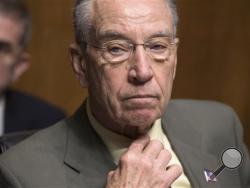WASHINGTON (AP) — With a name, face and judicial record finally fleshed out, President Barack Obama's pick for the Supreme Court vacancy is ready to commence courtesy calls with senators that Democrats hope will ultimately put unbearable election-year pressure on Republicans refusing to consider any Obama nominee.
Merrick Garland planned to visit two top Democrats on Thursday, a day after Obama nominated the 63-year-old appellate court judge and former prosecutor for the seat. The White House said that after a two-week Senate recess, Garland will meet with Judiciary Committee Chairman Chuck Grassley, R-Iowa, who's been a chief focus of Democratic attacks for refusing to let his panel hold a hearing for anyone Obama selects, helping to doom the nomination.
Declining to see Garland was Senate Majority Leader Mitch McConnell, R-Ky., who has led the GOP's near-solid blockade against a hearing or vote until the next president makes a choice. But the planned meeting with Grassley — which his aides conceded could occur — underscored a willingness by a small but growing cadre of GOP senators to say they'd see the nominee, and in some cases take the process even further.
"I meet with anybody, and that would include him," said Sen. Jeff Flake, R-Ariz. Flake said if a Democrat is elected president this November, he'd want the Senate to consider Garland's nomination during a post-election, lame-duck session because "between him and somebody that a President Clinton might nominate, I think the choice is clear."
Flake's comment showed how Obama and the leading Democratic presidential contender, Hillary Clinton, have had a good cop-bad cop effect on some Republicans, who consider Clinton likely to make a more liberal selection should she enter the White House.
GOP Sens. Kelly Ayotte of New Hampshire, Susan Collins of Maine, James Inhofe of Oklahoma, Orrin Hatch of Utah and Rob Portman of Ohio also expressed an openness to meeting with Garland. Ayotte and Portman are among a half-dozen GOP senators in competitive re-election contests who Democrats hope will be pressured into backing hearings and a vote on Garland or be punished for their refusal by voters.
Opposition by most Republicans means Garland's confirmation remains an uphill climb. One reason for the intense combat over Justice Antonin Scalia's replacement is that Garland would tilt the court's 4-4 balance in the liberal direction after decades of conservative dominance.
"The next justice could fundamentally alter the direction of the Supreme Court and have a profound impact on our country," McConnell said Wednesday. "So of course the American people should have a say in the court's direction" by their selection of the next president.
McConnell's statement illustrated how the issue has blossomed into one coloring November voting that will determine White House and Senate control. Senate Minority Leader Harry Reid, D-Nev., has spent weeks tying Senate GOP opposition to any Obama court nominee to similar views by Donald Trump, the Republican presidential front-runner who many GOP leaders abhor.
"Republicans now face a choice between blindly taking their marching orders from Donald Trump, or doing their jobs and providing fair consideration to this highly qualified nominee," Reid said Wednesday.
Reid and Vermont Sen. Patrick Leahy, top Democrat on the Judiciary panel, planned to meet Thursday with Garland.
McConnell and Grassley aides said each senator spoke by phone Wednesday with Garland and told him the Senate won't act on his nomination. McConnell opted for the phone conversation, "rather than put Judge Garland through more unnecessary political routines orchestrated by the White House," McConnell spokesman Don Stewart said.
It took Obama nearly five weeks after Scalia's death to select Garland, who stood by the president as he announced his selection in a Rose Garden appearance.
Obama said Garland has "a brilliant legal mind" but also "understands the way law affects the daily reality of people's lives in a big, complicated democracy, and in rapidly changing times."
Garland is chief judge for the U.S. Court of Appeals for the District of Columbia Circuit, considered just a step below the Supreme Court in its clout because of its jurisdiction over administration policy.
A Harvard Law School graduate, Garland clerked for liberal Justice William Brennan Jr., an appointee of Republican President Dwight Eisenhower. As a federal prosecutor, he oversaw the investigation and prosecutions in the 1995 Oklahoma City bombing case and the case against Unabomber Ted Kaczynski.
As a justice, Garland would be expected to take liberal-leaning views on environmental regulation, labor disputes and campaign finance. On criminal defense and national security cases, he's earned a reputation for a law-and-order streak, siding often with prosecutors.
McConnell and Grassley were among four GOP senators still serving who opposed his confirmation to the court of appeals in 1997, while seven remaining Republicans voted "yes."
"He may very well be very good nominee. I voted for him earlier," said one of those senators, Pat Roberts, R-Kan. "But it's not about the nominee. It's about the process."
___
Associated Press writers Matthew Daly, Kathleen Hennessey, Mary Clare Jalonick and Josh Lederman contributed to this report.

